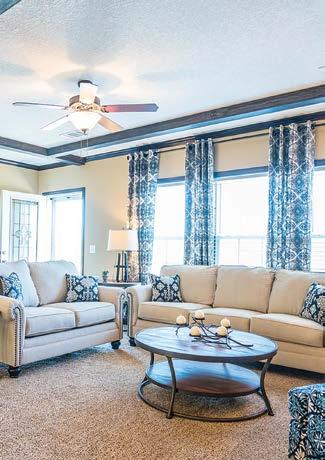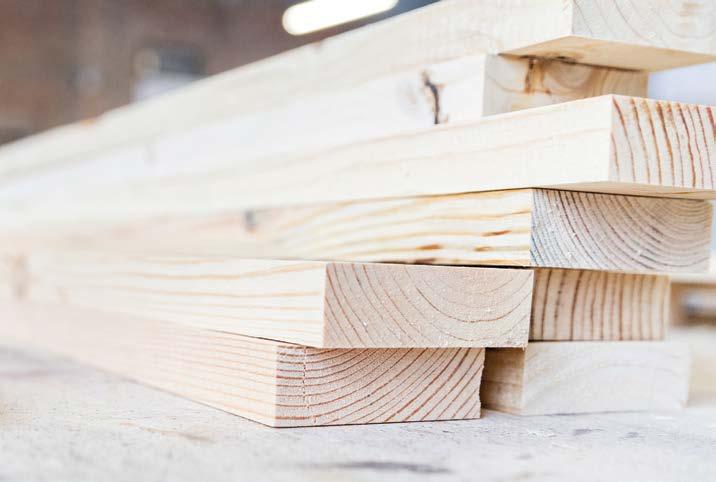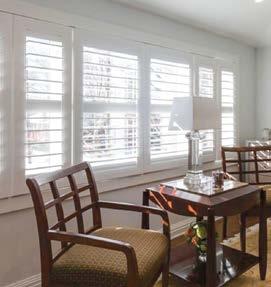
10 minute read
A Word from the State Execs
MHInsider asked the directors from four state associations across the country
their thoughts on the status of manufactured housing where they do business,
as well as input on the industry as a whole. Here is what manufactured
housing advocates from Alabama, Arizona, Florida, and Texas had to say.
» 1 What industry changes in your state require the most amount of your attention on a daily basis?
Florida Manufactured Housing Association Executive Director Jim Ayotte: We are spending more time dealing with new local government regulations. While Florida has done a good job preempting most industry regulation to the state, local governments are continually adopting discriminatory land use ordinances and regulations that make it expensive, if not impossible, to replace homes and redevelop older mobile home parks and manufactured housing communities. In 2019, the FMHA Board of Directors approved a local government strategy to challenge local government overreach. This strategy was effective in 2019 and will continue in 2020.
Alabama Manufactured Housing Association Deputy Executive Director Lance Latham: Much of the work we do is promoting the industry to the public through our social media and digital advertising campaigns. Our focus in those campaigns is in showing just how much our homes have changed and improved over the years. We spend a lot of time talking with homeowners and potential homeowners – especially through our social media platforms – about the changes in quality, efficiency, financing, and even the aesthetics of today’s manufactured homes.
Manufactured Housing Industry of Arizona President Ken Anderson: Changing enforcement standards by our SAA (State Administrative Agency) has consumed much of our industry.
Texas Manufactured Housing Association Executive Director D.J. Pendleton: This varies from what probably most would think and that which is most obvious - state legislative issues - to less thought-of issues like administrative rule writing and regulatory interaction with the industry. There is the whole other basket of issues serving members, answering questions, intervening when needed, developing tools, planning, and having events, and the other host of typical association duties. Then, of course, there are the random curve balls that come out of thin air.
» 2 What do you anticipate being the biggest industry breakthrough in your state this year?
Jim Ayotte: The equitable treatment of manufactured housing. Legislation has been proposed in the 2020 legislative session to reduce sales tax on manufactured housing by 50%. Currently, manufactured home buyers in Florida pay sales tax on a 100% of the purchase price of the home. A 50% reduction will make the sales tax on manufactured housing comparable with site-built homes. This proposal is being promoted as a middle-class tax cut and a way to increase the amount of unsubsidized affordable housing in Florida.
We are also continuing to aggressively challenge discriminatory manufactured housing land use ordinances. Last year, the threat of litigation was enough to convince at least
–Jim Ayotte
one city to change its discriminatory land use ordinance. The association is continuing with this strategy with the expectation that sooner or later litigation will be required. The longterm goal is to obtain a favorable legal decision to require local government to adopt nondiscriminatory land use policies statewide.
Lance Latham: Alabama is one of the leading states for manufacturing, and our manufacturers are always looking for new ways to stand out. With so many manufacturers bringing new and exciting developments to the industry, it’s hard to single out just one or two breakthroughs that we may see in 2020. »
Ken Anderson: The addition of the CrossMod™ product by one of our retailers using the Multiple Listing Service.
D.J. Pendleton: I’ve been doing this nearly 14 years, and our industry’s ability to innovate and try big bold new ideas still pleasantly surprises me. That said, it is difficult to forecast breakouts, I’d argue in pretty much any industry. But as far as a few of the many things we are looking at - roll out of CrossMods, federal responses to calls for zoning parity, manufactured home community sales and acquisitions trends in Texas, and MH market share growth in rural areas, in particular in the multi-section space.
» 3 What do you feel is the most relevant national issue in the industry today?
Jim Ayotte: There are two issues of utmost importance. Updating the HUD Manufactured Home Construction and Safety Standards and promoting the new CrossMod home. The HUD code must be comparable with state building codes. Otherwise, manufactured housing will continue







BuildingHUD&Modular Homessince2009
to be discriminated against and thought of as an inferior housing product. The HUD code needs to be updated on a continual basis to stay current with the International Residential Code.
The need for non-subsidized affordable housing for American workers has never been greater. The CrossMod home should open access to areas where traditional manufactured homes have been excluded. When consumers and public officials realize the benefits of the factory home building process, they will become more receptive to traditional manufactured housing and manufactured home communities. If embraced and promoted by industry, the CrossMod home has the potential to elevate the entire industry. In the words of President John F. Kennedy, ”A rising tide lifts all boats.”
Lance Latham: Zoning is an issue that is getting a lot more attention lately. We are also seeing more and more focus on communities and landlord issues. Another issue that doesn’t get as much attention but continues to be an area that many state associations are working on is fair and accurate appraisals, as well as the need for more installers and better training methods for the installer segment of the industry.
Ken Anderson: As I believe we are a finance driven industry, the progress of both Fannie Mae and Freddie Mac will have a substantial impact on our industry for both FHA Title I and II programs.
D.J. Pendleton: The financial institutions’ growing interest, acceptance, and participation in our various market segments. And then, hopefully, growing “comfort” with our industry.
» 4 What do you make of the current merging of factory-built and site-built practices?
Jim Ayotte: The merging of the factory-home building process with the site-built industry is not new. Site-builders have been using factory-built components for many years to achieve efficiencies. Think roof trusses and wall panels as examples.
The CrossMod home is another step in integrating factory construction to the building site. The CrossMod product offers traditional site builders a solution to one of their biggest impediments – the lack of skilled labor. The CrossMod also creates opportunities for traditional
manufactured home retailers wanting to expand their market reach. The lines between factory-built housing and site-built housing will continue to be blurred as more homes and components are constructed off site.
Lance Latham: Anything that helps expand our customer base or makes our homes better and more affordable is a good thing. There are a lot of Americans who have been caught in the housing crisis: wanting the look and feel of a site-built home without the larger mortgages that come with a site-built home. That’s where modern HUD-code homes, modular homes and, now, the new CrossMod homes can fill that need.
In many ways this is a natural merging as market competitive forces push both sides - site-built to gain efficiencies and lower costs and factory-built to learn from site-built to gain market acceptance in the eyes of would-be homebuyers and their lenders, and quickly by extension to governmental bodies.
D.J. Pendleton: We are pulling from a multitude of industries. We see advances in factory design to improve building conditions for labor comfort, as well as efficiency, and retention. And then with experiments in automation, robotics, 3D printing, and utilizing new materials and technologies. If Amazon moves products around in their massive warehouses on robots and SpaceX is landing rockets back on floating drone ships in the ocean after falling from space... I’d say there are ample industries we can learn from. Specifically, the factory to site-built merger has been occurring for some time now, mostly, I’d argue, in the interiors of the home. The more recent shift now looks to match exteriors as well as interiors.
» 5 What can you tell us about your recent conversations and negotiations that might be surprising?
Jim Ayotte: Everyday numerous news articles are published detailing the need for affordable workforce housing. On one hand I have been encouraged by the attention given »
Come visit us at the 2020 TUNICA SHOW M arch 24-26
We have a division solely dedicated to servicing our Manufactured Housing partners and customers. We help your customer achieve their dream of affordable home ownership by offering:


► VA, FHA, and Conventional loans for land and home ► Non-occupying co-borrower programs ► Various payment options ► Stage funding & end loan programs
CONTACT A MANUFACTURED OR MODULAR HOME LOAN SPECIALIST TODAY! 1.844.370.3323 ManufacturedHousing@ffbf.com OPEN MONDAY THRU SATURDAY
to alternative types of housing, such as tiny homes and container homes, but at the same time I have been perplexed by the short shrift given to manufactured housing. The industry’s time has come to be recognized as part of the solution to this country’s growing need for unsubsidized affordable housing. The industry needs to plow resources into educating consumers and public officials about the unique role of manufactured housing in addressing one of the country’s most challenging social and economic issues.
Lance Latham: There has been a push both nationally and here in Alabama for more investment in infrastructure. Those road and bridge construction projects cause traffic delays, but those delays sometimes get blamed on the trucking industry and, more specifically, drivers transporting manufactured homes along the interstates. So, the surprise has been a recent interest from some lawmakers in trying to further restrict the hours when we can transport our homes. So far, we have had success negotiating with lawmakers to find an industry-led solution, but the issue is certainly not settled.
Ken Anderson: The need for affordable housing is forcing cities, towns, counties to open their eyes to MH.
D.J. Pendleton: I’m not sure I have anything surprising that I can share. I will say, the general sentiment I hear is continued optimism, which I still like hearing because I’d equate the majority of people in our industry as candid realists. For anyone who has been through a few of the downturns they remember those conversations at times with people worrying about where the bottom was going to be. My general rule is that if you are willing to listen and regrettably accept the bad, then that also gives you license to accept it when the same candid responses are positive. MHV
Take control of your utilities with our newest submetering solution.

Clubhouse or Management Office
• Nationwide submeter installation services • Automated leak alerts and monitoring • Eliminate outdated and error prone manual submeter reading • Pit rated, QMC ® encoder submeters suitable for all environments • Timely resident utility billing and collections • Integration with RentManager ® and other PM Software • Tehama Wireless submeter monitoring system includes Solar Repeaters & Submersible Transmitters that are suitable for any utility (water electric, gas) Providing submetering and utility billing services to the manufactured housing industry since 1983. ,
Guardian Water & Power Inc. sales@guardianwp.com 877 - 291 - 3141
UMH PROPERTIES, INC. A PIONEER IN MANUFACTURED HOUSING
As a publicly traded REIT (NYSE:UMH), we have been providing quality a ordable housing since 1968. Our portfolio provides high pro t margins, recession resistant qualities, reliable income streams and the potential for long-term value appreciation.
• $1.4 billion in total enterprise value • 122 communities, 23,000 homesites, 8 states • Housing approximately 18,000 families • 6,600 total acres, 3,400 acres in Marcellus and Utica Shale regions
Financial Information as of 9/30/2019.










